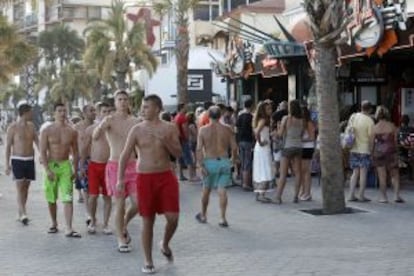Benidorm: seeing is (dis)believing
EL PAÍS visits the coastal city during the Low Cost festival, where María Jesús' accordion and the "magic" of Vicky Leyton reveal the contrasts to be found

Benidorm is a likeable and addictive city, one that is obligatory to visit - at least once in your life. The famous destination is characterized by its crazy architecture and towering apartment blocks, which stand proud right at the edge of the sea. This much everybody knows. But the radical contrasts Benidorm offers are less obvious. On the one hand we have María Jesús and her accordion; on the other, Vicky Leyton and her vagina.
María Jesús is pretty famous in her own right: 31 years ago she invented something called The Birdy Song on her squeezebox. For 40 years, she has been performing five times a week at the Arenas café on Benidorm's esplanade, from April (when the old folk, my public, begin to arrive), to the end of the season, around October. Today, Sunday, at 11pm, the seniors crowd expectantly in the doorway. There is a mirror ball and faded photographs of the culinary fare on offer. María Jesús takes the stage and begins her show with a Spanish two-step.
Sometimes she plays cheesy, timeless Spanish favorites like Paquito el Chocolatero , El sitio de Zaragoza , or El Candil ... "But I always leave The Birdy Song until last," she says. "I haven't done badly. I made less money from the song than a lot of people think, but I made a lot more than people might think as well," she says with a candid smile.
It is surreal, kitsch, gaudy, tasteless... call it what you will. It has to be seen
At the same time, a few meters away, in the so-called guiri zone - a depreciative term for foreigners, which is commonly used in the Spanish Mediterranean regions - Vicky Leyton is starting her performance. Note: this is a serious disclaimer. Any reader with a weak constitution may wish to skip the next few paragraphs.
Vicky is from the Canaries, is around 70 years old and is a sort of nemesis for María Jesús - like Batman and the Joker - as another of the most representative people in town. "The Legend," they call her. Her show consists of - this is your final chance to avert your gaze - pulling objects out of her vagina: Coca Cola bottles, giant candles, light bulbs (somehow glowing) and real razors.
For her finale, a bunch of flowers emerges.
The crowd at the Rose and Crown is very different to the one that comes to see María Jesús. The majority of Vicky's audience are young English men and women, most of the former sporting shaved heads and sleeveless shirts. Everyone drinks beer. Carmina Burana announces her arrival on stage, where she undresses to perform in the nude. "Yes, the things come out of there," she confirms after her show, before heading to the next bar along to repeat it. She has been doing her routine for 30 years, several times a night, seven days a week (she says she only takes New Year's Eve off). "Obviously as with all magic, there is a trick," Vicky confides. "I was a classical ballerina in Barcelona but during the Transition, when the trade was opened up, I had to reinvent myself. In the clubs people only wanted erotic shows, and a magician friend of mine gave me the idea. This isn't an erotic show, but rather a magic one."
It's true that there is more of the circus than eroticism to the show, which is admittedly disquieting but gives the spectator the same sensation as watching a fakir in action.

If María Jesús' gig takes place on the busy esplanade, where proponents of the shell game (the one with three cups and a pea) mingle with senior citizens dancing and everyday people strolling by in shorts and sandals, Vicky Leyton's side of the tracks, the guiri zone, is a mind-boggling universe.
Fake Amy Winehouses and a very short Michael Jackson do their stuff. Neon signs advertise strip clubs and there are mechanical bulls shaped like enormous penises. It is surreal, kitsch, gaudy, tasteless... call it what you will. It still has to be seen to be believed.
The city holds one final contrast. Last weekend it hosted the Low Cost festival, one of the most interesting the summer program has to offer.
The event consisted of three days, around 40 bands, 20,000 ticket holders, and an interesting VIP swimming pool. Attendees found out the following: The band fronted by Guille Milkyway, a former aspirant to the Eurovision song contest who has written a number of advertising jingles, is the best live act in Spanish music at the moment; If you let your guard down, the love songs of crooner Iván Ferreiro can tug some serious heart strings; Supersubmarina and Fuel Fandango take the stage by storm; and finally, Lorena Castell, a reporter for the television station Sol Música, has an incredible smile.
What's more, the two headlining bands, Suede and Placebo, who played on Friday and Saturday, respectively, can still deliver a brilliant live show despite being a bit past their sell-by date.
Benidorm is a strange city, and even more so if you are suffering from a hangover - although it is not strictly necessary to have one to draw conclusions. "Last year we played here," says Pucho, the lead singer of Vetusta Morla, which played on Sunday night. "And this year they have built even more apartment blocks. There is something we're missing with all of this."
One of the group's songs is called El hombre del saco (roughly translated as the Boogey Man), a fierce criticism of the people that pull the strings. A good right hook. It is probably better to watch instead the amusing promotional video that the festival organizers recorded to lure punters, in which several retirees are seen living the fast life to a soundtrack of thumping pop beats. "Don't wait until you're old to come to Benidorm," is its title.
It is a truism that should be taken on board, at least once anyway, and if your visit should coincide with the Low Cost festival, so much the better.
Tu suscripción se está usando en otro dispositivo
¿Quieres añadir otro usuario a tu suscripción?
Si continúas leyendo en este dispositivo, no se podrá leer en el otro.
FlechaTu suscripción se está usando en otro dispositivo y solo puedes acceder a EL PAÍS desde un dispositivo a la vez.
Si quieres compartir tu cuenta, cambia tu suscripción a la modalidad Premium, así podrás añadir otro usuario. Cada uno accederá con su propia cuenta de email, lo que os permitirá personalizar vuestra experiencia en EL PAÍS.
¿Tienes una suscripción de empresa? Accede aquí para contratar más cuentas.
En el caso de no saber quién está usando tu cuenta, te recomendamos cambiar tu contraseña aquí.
Si decides continuar compartiendo tu cuenta, este mensaje se mostrará en tu dispositivo y en el de la otra persona que está usando tu cuenta de forma indefinida, afectando a tu experiencia de lectura. Puedes consultar aquí los términos y condiciones de la suscripción digital.








































